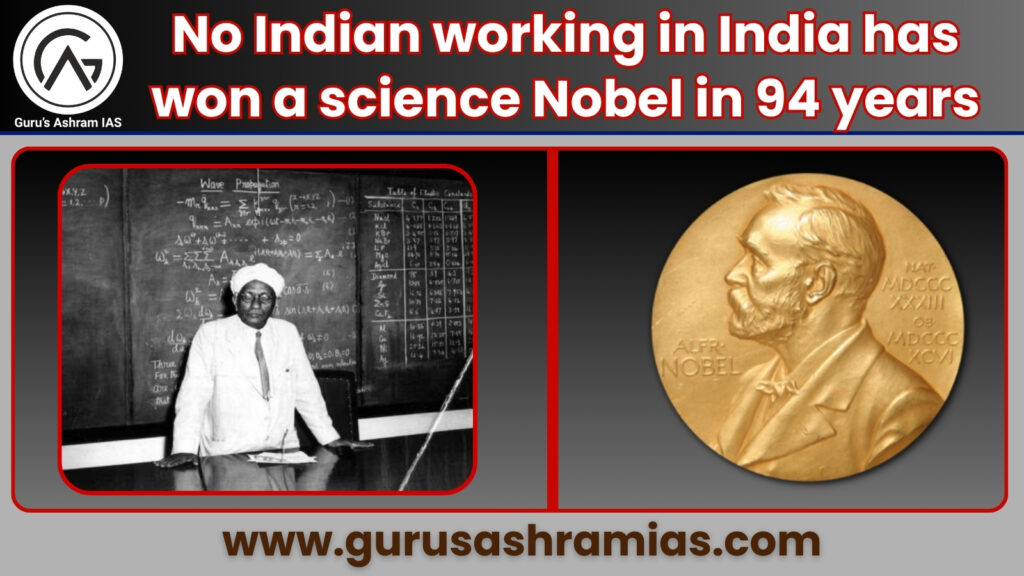No Indian has won the Nobel Prize in Physics, Chemistry or Medicine in 94 years.
- No Indian working in India has won a Nobel Prize in Physics, Chemistry or Medicine in 94 years.
- The lack of Nobel Prizes in India is often considered a reflection of the state of Indian science, although other factors also play a role.
- The last Indian to win the Nobel Prize in Science was C.V. Raman, who won the Nobel Prize in Physics in 1930 for the scattering of light.
Reasons for India’s poor performance in Science Nobel Prizes:
Low public funding for research:
- The Indian government provides insufficient funding for scientific research, which hinders the development of groundbreaking work.
- Direct funding for basic research in India over the last decade has been at a low level of 0.6-0.8% of GDP, much lower than other BRICS countries.
- In fact, India’s total expenditure on R & D has declined from 0.82% to 0.64% of GDP between 2005 and 2023.
Excessive bureaucracy:
- Bureaucratic red tape in India’s research institutions hinders innovation and slows down scientific progress. For example: It takes 11 months to order equipment at IIT Delhi.
- The Rs 150 crore GST notice to IIT Delhi is an example of how tax policies create financial pressure on educational institutions.
- Government e-Marketplace (GeM) imposes the obligation of mandatory procurement platform for government entities.
Small Researcher Pool / Group:
- India has a disproportionately low number of researchers relative to its population.
- The number of researchers in India is five times less than the global average, which is reducing the number of potential contenders for the Nobel Prize.
Depends on the individual skills:
- In the absence of a robust research ecosystem, India’s chances of winning a Nobel Prize in the future are largely dependent on the individual brilliance of scientists rather than systematic support or infrastructure.
Discretionary powers in research institutions:
- The heads of many research institutions reportedly use these powers for personal career development (such as securing prestigious awards like Padma Shri or Bharat Ratna or extending their tenure after retirement), rather than focusing on the necessary research.
The lack of clear research:
- Many scientists conduct research on outdated or irrelevant topics, often based on failed experiments in the United States or the European Union, which have no practical application in India.
- For example, neglecting water technologies and agricultural innovation for high energy particle accelerators or complex nuclear fusion projects.
Focus on the expected quantity of quality:
- Most of the research carried out in government funded research institutions is focused on issuing publications “at the level of numbers” rather than on meaningful innovation.
Dependence on foreign technologies:
- Instead of developing original solutions, Indian scientists are often engaged in copying or adapting technologies developed abroad, which do not require deep scientific innovation or qualification.
Over-reliance on private sector success:
- Recent successes in vaccine development during the COVID-19 pandemic, achieved mainly by private sector laboratories, reflect a disjuncture between government-funded research institutions and successful scientific breakthroughs.
- This dependence reduces the credibility and necessity of government laboratories in scientific advancement.
Not getting enough experience:
- Even when foreign-trained scientists return to India, they often fail to perform to their potential due to an unhealthy institutional environment.
- They get stuck in the cycle of publishing irrelevant research and getting promoted rather than excelling or tackling major scientific challenges.
Not taking advantage of opportunities:
- Many notable Indian scientists did groundbreaking work but were either ignored or not nominated for the Nobel. Such as:
Jagadish Chandra Bose:
- He demonstrated wireless communication in 1895, but his work could not be recognized at that level, while Guglielmo Marconi and Ferdinand Brown were awarded the Nobel Prize for the same work in 1909.
K. S. Krishnan:
- He, along with C. V. Raman, discovered the Raman scattering effect, but he was never nominated for the Nobel.
ECG Sudarshan:
- The Nobel Prizes in Physics in 1979 and 2005 were awarded for works in which Sudarshan’s most original contribution was ignored for the prize.
- ECG Sudarshan worked on the electromagnetic interaction between elementary particles.
- Several Indian scientists (such as Meghnad Saha, Homi Bhabha, Satyendra Nath Bose, G. N. Ramachandran and T. Seshadri) were nominated for the Nobel Prize several times, but did not receive the award.
Western dominance in Nobel Prizes:
- The Nobel Prizes have been dominated by scientists from the US and Europe, who have strong scientific infrastructure and research ecosystem.
- Of the 653 people who have won the Nobel Prize in Physics, Chemistry or Medicine, more than 150 are from the Jewish community (a very high proportion) but Israel has won only four Nobel Prizes in science.
Indian origin scientist who won the Nobel Prize in Science:
Hargovind Khurana (1968, in Medicine):
- For decoding the genetic code and its protein synthesis function.
Subrahmanyam Chandrasekhar (1983, Physics):
- For his theoretical studies of the physical processes important for the structure and evolution of stars.
- They showed that when a star of a certain size starts to run out of hydrogen fuel, it transforms into a denser, brighter star known as a white dwarf.
Venkatraman Ramakrishnan (2009, in Chemistry):
- For studies of the structure and function of ribosomes.
What can be done to improve India’s performance in the Nobel Prizes in Science?
Increase in Public Financing for R & D:
- The Government of India should be committed to increase the percentage of GDP allocated to R & D, with an aim to reach at least 1.5% soon.
Encouraging high impact research:
- To promote and finance high-risk, high-benefit research initiatives leading to the development of revolutionary technologies.
Improving the evaluation process:
- Creation of diverse panels of reviewers with relevant expertise to evaluate research proposals.
- This will help ensure that valuable ideas are not overlooked due to biases or misunderstandings.
Expansion of the researcher pool:
- Promoting STEM education and investing in higher education can help develop a larger and more skilled pool of researchers.
Improving research institutions:
- Ensuring that funding and opportunities are allocated based on merit and potential social impact rather than individual ambition.
Leveraging public-private partnerships:
- Facilitate collaboration between government research institutions and private sector firms to enhance research capabilities and promote innovation.
Recognition of scientific talent:
- Establishing a national award program for outstanding scientific contributions, to encourage more significant efforts towards revolutionary work.
Strengthening global cooperation:
- To encourage Indian scientists to collaborate, share knowledge and resources with international research communities to enhance the prestige of Indian research on the global stage.




